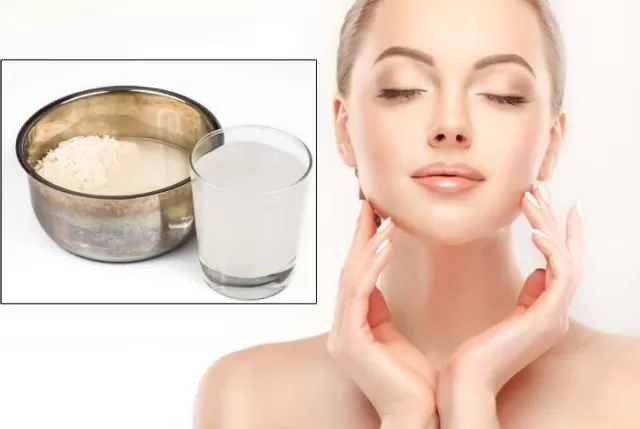The Potential of Rice Water for Hair Growth. As beauty product formulators introduce rice water as a buzzy ingredient for hair care in 2023, the question arises: Can rice water genuinely encourage hair growth? Seeking insights from beauty professionals provides valuable perspectives on the potential benefits of incorporating rice water into hair care routines.
Dr. Gaby Longsworth, a Ph.D., scientist, certified hair practitioner, and founder of Absolutely Everything Curly, provides an expert viewpoint on rice water’s hair-enhancing properties. She emphasizes that rice water is renowned for its protein and vitamin content, including vitamins C and E, minerals, amino acids, and antioxidants. These components collectively contribute to strengthening and nourishing the hair.
The Connection Between Dry Skin and Acne: Insights from Dr. Aanand N. Geria

Contrary to the common association between oily skin and acne, dry skin can also be a culprit in the development of breakouts.
Dr. Aanand N.
Geria, a board-certified dermatologist and founder of Geria Dermatology, sheds light on the dynamics of how dry skin can contribute to acne.
Dry skin, characterized by a flaky, rough texture and potential redness or sensitivity, is an indication of insufficient hydration.
In the winter months, factors like indoor heating, low humidity levels, and harsh winds can exacerbate dry skin. However, dry skin can also have a genetic component.
Dr.Geria explains that when the skin is dry, the oil glands may go into overdrive to compensate for the lack of moisture. The body responds by producing additional sebum as a way of providing extra hydration to the skin.
However, this excess sebum, combined with the presence of flaky, dead skin cells, can lead to clogged pores.
The clogging of pores creates an environment conducive to the development of pimples.
In essence, the interplay between heightened sebum production and the accumulation of dead skin cells becomes a contributing factor to acne formation in individuals with dry skin.
Understanding this relationship highlights the importance of maintaining a balanced and well-hydrated skin barrier to prevent the overproduction of sebum and reduce the likelihood of acne breakouts in individuals with dry skin.
Identifying Acne Caused by Dry Skin: Visual Cues and Insights from Dermatologists
Pimples resulting from dry skin share similarities with other types of acne, typically presenting as red, inflamed bumps filled with pus.
Dr. Aanand N. Geria, a board-certified dermatologist, provides insights into recognizing acne caused by dry skin by examining the overall condition of the skin.
While the appearance of acne may resemble regular pimples, the distinguishing factor lies in the skin background.
Acne triggered by dry skin will often manifest on a backdrop of scaly or flaky skin. Additionally, the skin may exhibit a dull appearance, and the face may feel overly taut when attempting facial expressions.
Dr.Julia T. Hunter, a board-certified dermatologist, emphasizes that acne causes can be multifaceted, extending beyond dry skin.
Internal factors, such as hormone shifts or inflammation, as well as external factors, including incompatible Skincare Products or inadequate cleansing and exfoliation, can contribute to breakouts. The common thread among these factors is an underlying imbalance or irritation that requires attention.
Understanding the visual cues associated with acne caused by dry skin, coupled with a consideration of broader factors influencing skin health, empowers individuals to tailor their skincare routines and address the root causes of breakouts effectively.
This nuanced approach enables a more comprehensive understanding of acne triggers and informs targeted strategies for achieving clearer and healthier skin.
Effectively Treating Acne Caused by Dry Skin: Dr. Aanand N. Geria\’s Recommendations

Addressing breakouts triggered by dry skin requires a thoughtful approach that simultaneously addresses both hydration and acne concerns.
Dr. Aanand N.
Geria, a board-certified dermatologist, provides a comprehensive guide on how to treat acne caused by dry skin without exacerbating either condition.
Step 1: Gentle Cleansing.
Wash your face twice daily, focusing on a gentle, hydrating cleanser in the evening before bedtime.
Excessive washing can irritate the skin, potentially worsening acne breakouts.
Step 2: Sun Protection.
Avoid sun exposure, as UV rays can damage skin cells and contribute to skin cancer.
Apply a lightweight, moisturizing sunscreen every morning to protect your skin.
Step 3: Spot Treatment.
Opt for a spot treatment approach rather than all-over scrubbing or exfoliating.
Hydrocolloid patches are effective in pulling pus out of pimples quickly. Alternatively, consider using a salicylic acid serum or sulfur-based acne treatment specifically on the affected areas.
Step 4: Moisturize and Hydrate.
Despite the production of sebum, using a moisturizer is crucial in treating acne caused by dry skin.
Choose a simple, non-active moisturizer and apply it to your skin in the morning and evening. Additionally, use a humidifier, especially while sleeping, to add moisture to the air and enhance hydration.
Dr.Geria’s recommendations underscore the importance of a balanced skincare routine that addresses both dryness and acne. By choosing suitable products and adjusting skincare practices, individuals can effectively manage these dual concerns, promoting healthier and clearer skin.
When to Seek Dermatological Assistance for Acne

If you find yourself unable to pinpoint the cause of your acne or have exhausted over-the-counter options without noticeable results, it’s advisable to reach out to a board-certified dermatologist for professional assistance.
Seeking a dermatologist’s expertise is crucial in cases where self-diagnosis or self-treatment proves challenging.
Key Indications for Consulting a Dermatologist:.
Persistent or Severe Acne: If your acne persists despite various attempts at self-treatment or worsens over time, consulting a dermatologist is essential for a thorough evaluation.
Unidentified Cause: When you’re unable to identify the specific cause of your acne, a dermatologist can conduct a comprehensive examination to determine underlying factors contributing to your skin condition.
Lack of Improvement with OTC Products: If over-the-counter products fail to yield visible results, a dermatologist can recommend personalized and effective treatment options tailored to your skin type and concerns.
Professional Examination and Treatment Plan: Dermatologists possess the expertise to examine your skin, diagnose underlying issues, and devise a targeted treatment plan that aligns with your unique skin needs.
By seeking professional guidance, you can access specialized knowledge and personalized care to address your acne concerns.
Dermatologists are equipped to offer insights, conduct thorough assessments, and recommend evidence-based treatments that may include prescription medications, advanced skincare routines, or in-office procedures. Don’t hesitate to reach out to a dermatologist when faced with challenging or persistent acne issues.
*The information is for reference only.